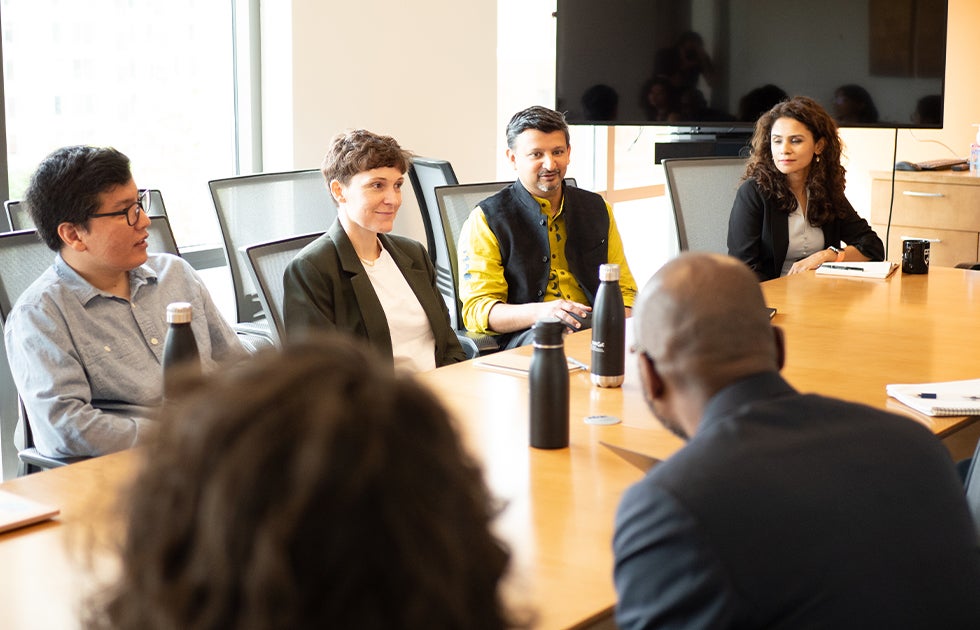
Teaching
CARGC faculty and postdoctoral fellows teach courses in Global Communication at the Annenberg School. Find out what courses we are offering this semester and view the archive of previously taught courses below. If you would like to request a syllabus for any of the courses, please get in touch with the instructor.
Fall 2025 Courses
Global Media Industries
COMM 4180
Instructor: Aswin Punathambekar, Ph.D.
The phenomenal expansion of digital media infrastructures and platforms are transforming the production, promotion, and circulation of films, television programs, music, video games, and other media entertainment and popular cultural forms. Moreover, media artifacts routinely move across national borders with audiences playing an increasingly participatory role. This course focuses on the operations, discourses, and logics that drive contemporary media industries in major media capitals around the world including Mumbai, Seoul, Istanbul, Mexico City, Dubai, and Los Angeles. Taking a historical approach, we will examine the economic, political, and socio-cultural factors that shape developments in the media industries, relationships between powerful centers of media and cultural production, and the ways in which industry professionals respond to the challenges and opportunities of digitalization and new geo-political alignments in the 21st century.
Media and Cultural Theory: Canonic Texts and Beyond
COMM 7430
Instructor: Aswin Punathambekar, Ph.D.
Can a field of study as cross-disciplinary as media studies have a set of canonic texts? Should there be a canon? And if so, which texts and scholars would we regard as canonic to the field? In a landmark volume published in 2002, Elihu Katz et al. answered these questions with a book that mapped five schools of thought – Columbia, Frankfurt, Chicago, Toronto, and Birmingham (British Cultural Studies) – and explored how they came to define areas research and shape the formation of distinct scholarly communities. Yet two decades ago, media and communication studies scholars were only beginning to take seriously the critiques and interventions being developed by scholars of race, gender, and postcoloniality. Now, students and scholars in media studies and other allied disciplines in the humanities and interpretive social sciences are grappling with the epistemic, ideological, and moral flaws of Eurocentric thought and in the process, re-vitalizing keywords, concepts, and theories. In this seminar, we will read and engage with canonic texts, delve into the historical conditions of the production of those texts, their afterlife and varied impact(s) on the field, and engage with critical responses that help recast their theoretical and analytic value for us today.
Media in Crisis
COMM 7570
Instructor: Juan Llamas-Rodriguez, Ph.D.
The climate crisis. The migration crisis. Economic crisis. Democracy in crisis. In this course we take a critical interpretive lens to analyze the role that media play in the growing “crisis imaginary” plaguing the twenty-first century. Drawing on scholarship informed by critical theory across various disciplines, we explore key questions about the relationship between mediation and crisis thinking. How do the different affordances of media (from radio to television to networked digital platforms) shape the public’s perception of a crisis? How are the political stakes of a crisis informed by who has access to and power over the technologies and infrastructures of media? How is the very temporality of a crisis, its emergence, duration, and (in)finitude, a question of mediation? Finally, we consider what happens when media itself is in crisis: when the institutions and norms — and theories — set up to make sense of ongoing crises are themselves in a moment of transformation or undoing.

Past Courses
CARGC faculty and fellows teach a wide variety of courses on global communication topics.
